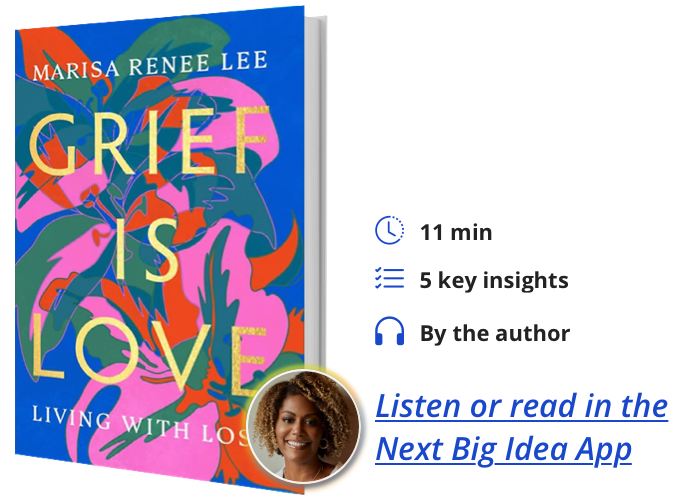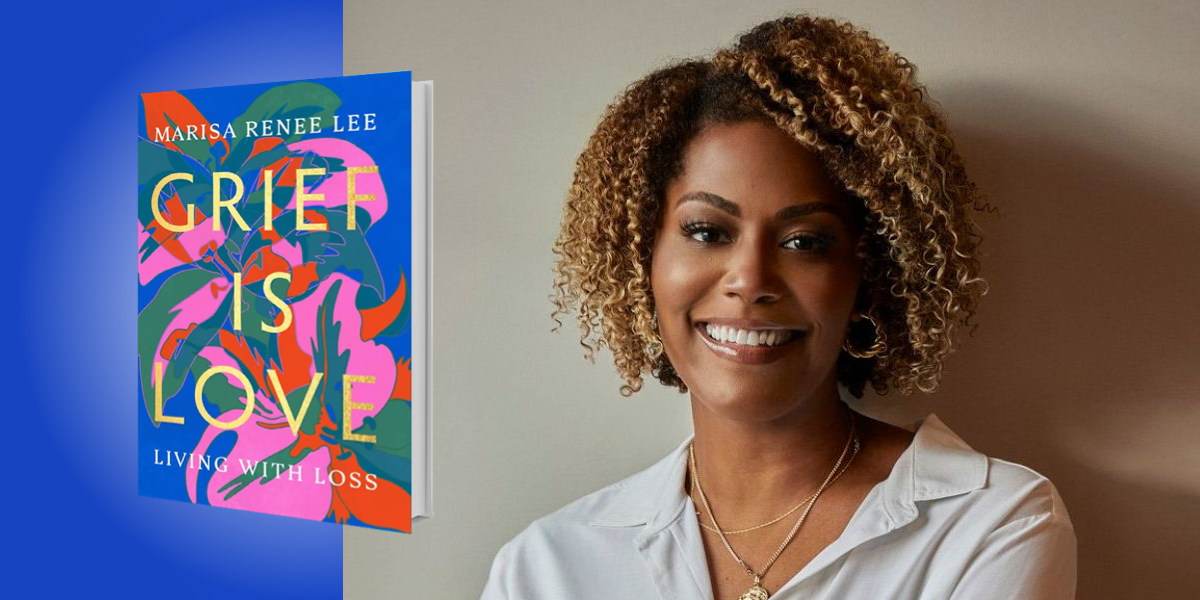Marisa Renee Lee is a rabble-rouser of social healing. She’s a former appointee in the Obama White House; Managing Director of My Brother’s Keeper Alliance; co-founder of the digital platform Supportal; and founder of The Pink Agenda, a national organization dedicated to raising money for breast cancer care, research, and awareness.
Below, Marisa shares 5 key insights from his new book, Grief Is Love: Living with Loss. Listen to the audio version—read by Marisa herself—in the Next Big Idea App.

1. Give yourself permission to grieve.
When my mom was diagnosed with stage 4 breast cancer—on top of the multiple sclerosis that she was already living with—I instantly knew that she was going to die. But at the time, I didn’t realize that all the complicated feelings I was having about that fact were grief. And even if I had known they were grief, I probably still would have ignored them, and tried to run from them.
But I can tell you from my experience that that doesn’t work. When we fail to give ourselves permission to grieve, we usually cause ourselves more pain and suffering. I had to recognize that it is okay to grieve. It is okay to be sad. It is okay to have lots of feelings about the loss of someone or something you love. That is the first step toward healing, and to being okay living with loss.
So if you are in it right now, I want to encourage you to give yourself permission to grieve. Alternatively, if you lost someone 5, 10, 20 years ago, and you still struggle sometimes with their absence, I want to give you permission to grieve as well.
“When we fail to give ourselves permission to grieve, we usually cause ourselves more pain and suffering.”
2. Nix the “stages” of grief. Grief is forever.
My mom has been dead for almost 15 years. And as far as I can tell, the grief doesn’t go away. Does it feel as intense and challenging as it did in the weeks and months right after she died? Absolutely not. But I still have moments when I really miss her, when I cry because she’s not here to enjoy my son with me. Or even moments when I laugh at something, thinking of her, or just remembering an experience that we shared.
Those feelings of loss and longing and nostalgia—I don’t think any of it ever fully goes away. So I want you to get rid of any timelines you have set for yourself around loss. I don’t care how long it’s been. It’s okay if you are still hurting, or if you are still missing them, or if there are still things that you need to support you as you work to live with loss.
We always hear about the five stages of grief from Elisabeth Kübler-Ross, and she was a brilliant researcher. But even she has said two things that I think are really important for everyone to know. The first is that those five stages of grief were not created for someone trying to move through the loss of a loved one—they were created for people who are dying themselves. Somewhere in the game of historical telephone, that message got lost, and we’ve started applying the stages to a situation that they were not created for.
The other thing she said many times is that even if you do think those stages are something you can work with as you move through your loss, they are not sequential. The way you think of stages in child development, or other stages where it’s step one, then step two, then step three and step four, and then you’re done—no. There is no consistent or clear path when it comes to loss.
“Those five stages of grief were not created for someone trying to move through the loss of a loved one—they were created for people who are dying themselves.”
3. Grief requires grace.
When you are grieving the loss of a loved one, you need to offer grace to yourself when you don’t move through the loss in the way you wanted to. You need to offer grace to other people when they don’t support you in the way you wanted them to. And you also need to be prepared to ask for grace from others, because living with loss is hard. There may be times when you’re not able to show up the way someone else might expect you to. You may not be able to be the perfect wife or mother or spouse or best friend. So I think grace is a really important consideration when you are trying to live with the loss of someone you love.
4. In the midst of grief, joy is possible.
A lot of people try to “fake it till you make it” when it comes to experiencing joy and happiness after losing someone they love. Joy can and should be part of your life as you live with loss, but there is no “fake it till you make it” strategy when it comes to joy in the context of grief. Joy arrives when we are honest and upfront about our pain, about our struggles and our challenges and how hard it is.
I had one of the best, most inappropriate spells of laughter in my life at my mother’s funeral. I was sitting in the front row with my cousins, my sister, and my grandmother. And this woman who we hired to sing stood up—and she was so bad. In that moment of intense mourning and sadness, we had a little bright spot of laughter, because we just couldn’t help ourselves. It was truly that bad.
“Joy arrives when we are honest and upfront about our pain, about our struggles and our challenges and how hard it is.”
Did that mean that I was somehow over the loss of my mother? Absolutely not. I was sitting a few feet away from her casket. But it did mean that because I was honest and present, I was able to have that brief moment of joy before we buried my mom.
5. The foundation of grief is love.
The love we share with people who are no longer here doesn’t die. That is why we grieve. This idea is supported by leading research around grief and loss. The “continuing bonds theory” argues that one of the healthiest ways to live with loss and move through the hardest parts of grief is to find a way to continue your bond with the person you lost. This looks different for everybody, but in my case, it’s finding ways, big and small, to make sure that other people I love who never met my mother can experience her. It’s making her favorite cookies for my son. It’s celebrating her birthday with my husband, even though he’s never met her.
If we can reconceptualize grief as part of the experience of loving people, and if we can find a way to carry that love forward—no matter how long they’ve been gone—I really do believe that makes living with loss so much easier. I feel pain because my mother is no longer here, because of the love we shared when she was on this Earth. The pain of grief is the pain of unrequited, unconditional love. She’s no longer here to act on the love that she has for me, but I know she still loves me, in the present tense. And I am committed to finding ways to capture that love and share it with other people.
To listen to the audio version read by author Marisa Renee Lee, download the Next Big Idea App today:
































